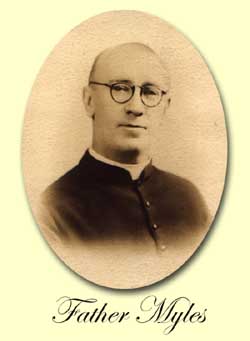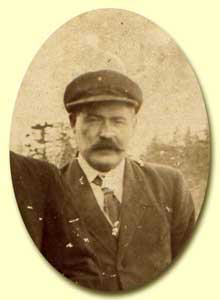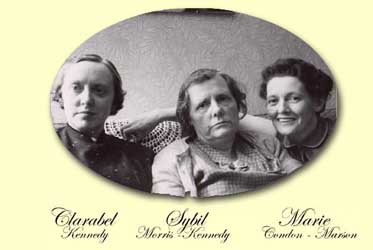1882
to 1907
The parish was advantageously progressing in agriculture and fishery as
well as increasing in population.
In
the month of October 1882, Revd. Gillis was
appointed P.P. of Douglastown. That seemed the dawn of a better day.
Father Gillis was born at St. Curnin in
Scotland December 27, 1837, and ordained a priest at Paris April 7,
1867.
He came to Rimouski
at the request of Bishop Langevin who was in need of more priests
for his diocese. Father Gillis was pastor
here for 25 years. His principal work was the building
of a convent of which he took great pains and obtained generous help
from the Dominion Government. The Honorable Rudolph Lemieux was representative
for the Gaspe county at the time and a more worthy man has never since
been replaced.
That
was in 1900 and now we are in 1930.
The convent in Douglastown, the building of the breakwater, the building
of the railroad, as many other monuments throughout the county are
all evidences of the many improvements under the Lemieux membership.
|
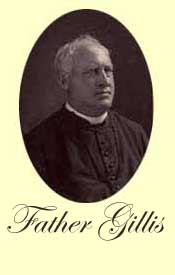 |
Father Gillis was termed in the province of Quebec, The Apostle of Education.
Father Gillis obtained from his wealthy friends abode generous donations
- the building of his convent. It was completed in the summer of 1900 and
blessed on August 26. The building 57'X31' and has a kitchen(24'X20').It
is two story and has one stone foundation. The blessing of the convent was
very solomnly presided over by the Bishop of Rimouski, Bishop Gautier of
Kingston, Ontario, was also present, also 50 priests from different parishes
and more than 2000 persons witnessed the ceremonies. The sisters of The
Holy Rosary to whom the convent was dedicated were also present at this
splendid ceremony.
The classes in the convent opened on September
1, 1900 to admit about 70 people. Revd Mother Mary of Calvary
as first Superior. The first teachers were Mother Mary of Mercy, Mother
Mary of Lourdes, Mother Mary St. Julie. At the same time the convent was
blessed, a bell for the convent, weighing 100 pounds, was given from a former
pastor, Father Farfard. The bell was christened by the name Mary Joseph.
Beloved Father Gillis lived in our midst for 25
years venerated and loved by all as a real Father.
He died on December 27, 1907. His remains rest peacefully under the altar
of the St. Patrick's church with a magnificent marble slab. The same dedicated
by Sir Wilfred Laurier, Prime Minister of Canada and our worthy representative
in the House of Commons. At Ottawa, R. Lemieux inscribed on his tomb "Transit
Benefaciend" and it is true. His memory is and shall be dear forever to
those who have the pleasure of knowing him.
1907 to 1921 Revd Father Gauthier on the second
Sunday of January 1908 came to replace Father Gillis. Father
Gauthier was parish priest in Gaspe' village for many years. Although of
Acadian descent, Father Gauthier has a strong veneration for the Irish as
the feast of his ordination is on March 17th. His 25th anniversary was celebrated
on St. Patrick's Day and a large banquet was held in his honor.
|
It was during the years
of Revd Gauthier's stay amongst us that was begun and completed
the building of the railroad taken over by the government C.N.R.
The station was built on the sand bar. A large iron bridge was built
over the tickle and on August 5, 1909 the first engine moved on
towards Gaspe.
The
regular train came right through for the first time in 1913, a rejoicement
to all, as it put us much nearer to the outside world.
One of the first foremen on the railroad was Richard Keiler, a Scotchman
by birth, he became a Catholic in Douglastown in 1909 and made his
first communion in the Convent Chapel of The Holy Rosary Convent.
Returning to Father Gauthier, he was a
great preacher and did much good to keep his faithful in firm piety.
In 1921, he became very ill and had to be taken to the hospital.
1921 to 1926 Father G. E. Myles.
|
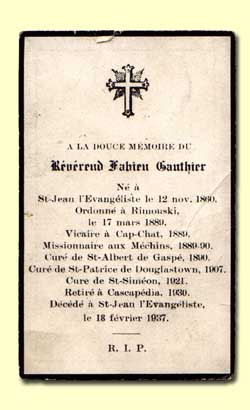 |
In 1921 Revd Father Myles, a Gaspesien by birth and of Irish descent came
to Douglastown as parish priest. He was at that time and had
been for five years previous parish priest at Mont Joli, one of the most
important parishes in the Rimouski diocese, replacing there his Lordship
R.R. Leonard, who was consecrated Bishop of Rimouski.
Father Myles arrived on November 6. It was a stormy day and besides old
Harry, a very slow old horse owned by Mr. Xave Kennedy, and a slow old
driver, no one else was there to meet and greet the new priest. In a few
days the presbytery was conveniently fitted up, in the meantime lodging
with Mrs. Xave Kennedy, Father Myles soon became acquainted with his Irish
faithful and very soon understood that better days were drawing for the
improvement of the parish and the welfare of all. Full of zeal.
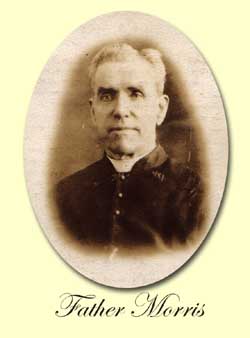 |
17
Appendix Personages of note born in Douglastown.
Father Elias Morris, son of James Morris and Agnes Rooney who
was many years parish priest at Fox River. He was a great singer and
musician, a real descendent of the Irish Minstrals of Erin.
Father Owen Kennedy son of Michael Kennedy and Anastasia Connick,
P.P. of Cartier, Ontario.
Brother Thomas Girard, Oblite in Mission City, British Columbia, son
of Alexander Girard and Mildred Morris.
Brother Robert Finn of the Sacred Heart Community of Athabaska, Quebec,
son of Patrick Finn and Beatrice White.
Sister Margaret
Kennedy, daughter of Michael Kennedy and Mary Condon. Congregation
of Notre Dame, Montreal.
|
 |
Brother Lester Grant
- Ottawa, son of Albert Grant and M. Maloney.
Sister Mary St. Bridget - Holy Rosary Convent, daughter of William
Rooney and Catherine Rahel.
Name - Grace Sister St. Patrick, Mary Ann Maloney, daughter of Archibald
and Dora McDonald.
Sister Mary of St. Clarence and Sister Mary of St. Gabriel - Vivian
and Louisa Bond, daughters of Thomas and Nora Morris.
Sister Mary of St. Bertha, Sybil Gaul - daughter of Malcam Gaul
and Bertha Morris.
The
population of our parish is 11 099.
In 1928 Father Myles established the mission of Bois Brule, having
a part of the school house prepared for a chapel, once a month the
people have a mass celebrated at their mission to have the advantages
of performing the Devotion of Confession and Communion.
|
The last lines completed from
1775 to 1928, between 1928 and 1936 not many changes of note to record
to the happenings of our parish. A butter factory and a cooperation society
was organized, but through errors and financial failures, both were abandoned.
We have up-to-date roads now from Montreal to Gaspe, a wonderful trade.
Grand hotels and restaurants open at early season and are operated many
months. We have graders, tractors, buses, and all up-to-date conveniences
for speed and comfort.
Time Marches On ..... And has brought us to 1937 to 1938.
I come to relate a few items that has happened.
We have now in our parish a new rectory, a handsome
new structure fire proof or supposed to be, as it is made of brick and
asbestos. The building is modern. It is fitted out with hot
and cold water sustem, electricity, furnace, a modern heating system and
everything for comfort. I cannot record the cost of this structure because
sufficient today no statistical account up to date - May 17, 1938, has
been given.
There has also during the past year been erected a parochal or theatrical
hall, also modern and up-to-date. Since Easter
Monday April 17, 1938, motion pictures are showing every Tuesday, Thursday
and Saturday. They are very good. This is evening entertainment.
Of this hall I cannot record the cost for it is not known. The $24,000
savings of the Fabrique for many years has been expended on the labor
and building of rectory and hall. Both buildings were erected without
the consent of some of the rate payers who pay the highest tax. The majority
in favor were those who receive relief. Many were in favor of building
a new church of which we are very much in need as our old church will
soon be a thing of the past. The ruins of the poor old church is now faillng.
The actual church wardens for 1937 to 1938: Michael McDonald, Daisgaie
Roberts and Anthony Element re-elected for 1938.
A few lines more about driving the mail and post
office.
In the early days there was no roads in Gaspe
Peninsula, only a trail through the forest along the sea shore and the
journey from place to place was tiresome as I have heard the old folks
say.
I have been told that the first post office was in Carleton, 1796. The
mail would come once a year from Fredericton, N.B. and in 1805 somewhere
in the Bay of Chaleur there was a post office kept by J.B. Mann.
Next came Gaspe service and the post office Henry Johnson was in charge.
In 1829 he was living in Douglastown and in 1829
matters got better and the mail for Bay of Chaleur and Gaspe came three
times a year.
Before that, letters were sent by vessels or
schooners going from Quebec to Gaspe and Bay of Chaleur.
This service was unsatisfactory, so John LeBoutillier applied for a regular
postal service between Bay of Chaleur and Gaspe.
Archibals Kerr was the first mail contractor in Gaspe Peninsula. He and
his sons used to take the mail from Port Daniel to Dalhousie.
At Port Daniel the courier from Gaspe met the ones from the West, like
others, on snow-shoes in winter.
The usual trip per day was from Port daniel to Perce; 50 miles distance.
Going up the St. Lawrence River out to the shore via river. From Gaspe
to Quebec the mail was carried on snowshoes.
One of the earliest couriers was Edward Synnett,
he made the journey through the winter 104 years ago. Once
he made a journey in one day - 54 miles from Magdalen River to Griffin
Cove, he and an Indian. The Indian gave out, but the white man struggled
on alone.
The couriers often had to take shelter in camps
and shacks.
Their wages in them days was paid by by the merchants from Gaspe to Port
Daniel. Nicolas Mullin, one of the old mail carriers, took a month in
the winter to go from Gaspe to Port Daniel. In 1839, Benjamen Patterson
contracted to carry the mail from Gaspé to Port Daniel making the journey
in eight days. Most of the way, the only path
was along the seashore;when the Indian trail was through the woods, it
was no more than 3 feet wide, and no bridges over the rivers.
There were no stamps or envelopes:
the price was stamped on the letter which was folded and sealed secure.
When you received a letter you had to pay the price stamped which varied
from 30 to 60 cents for old country letters.
The mail contract from Gaspe to Perce from 1851 to 1872 was carried over
night at the home of my Grand-dad, Isaac Kennedy. The property
now owned by Austin Kennedy. Patterson was succeeded by Tapp and Leggo.
The driving of the mail has had many changes. Finally
in 1911 one daily mail now of 15 and 20 sacks is heavier than the twice
monthly mail of the olden day.
|
Post
Masters of Douglastown:
Henry Johnson
Charles Veit Sr.
Louis Bosse
Charles Veit Jr.
Fred Kennedy
Mrs. Dupuis
Isaac Kennedy
Edward Trachy
Leo Kennedy .
Many
years ago those holding government jobs was controlled by changes
of politics. Liberal or Conservative usually when the
candidate for whom an elector voted, he would try to obtain and
retain a position for a supporter of the party he represented But
in the present age, civil service committee controls the change
of positions such as: light keeper, customs, collectors, postmasters,
etc.
|
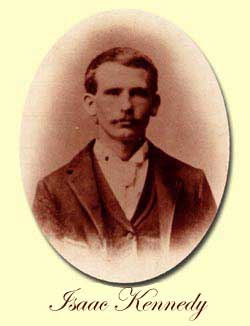 |
In the case of the postmaster,
especially here in Douglastown with reference to change of postmasters
be it well remembered the retaining of the post
office here in 1935 was entirely controlled by Knights of Columbus and
Holy Orders. Politics was cast aside, ignored, and the
present postmaster Leo Kennedy is retained by personal favor and that
alone.
| Many
years ago, a militia was formed in the counties of Gaspe and Bonaventure.
In Company Division No. 7 was Captain Lieutenant James Kennedy, grand
uncle of Austin and Mathilda Kennedy and great grand uncle of Allan,
Clarabel and Sybil Kennedy, children of Austin Kennedy
and Mary Condon.
|
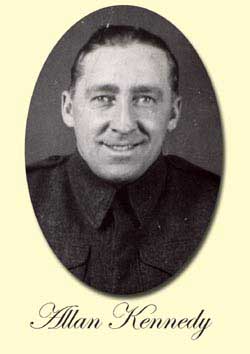 |
The
first merchant of Douglastown was William Kennedy who kept a small supply
of provisions for the fishermen who came here for the summer months.
Second as I have been told was a Jew, Sanders
also about the same time was Davis, another Jew both from Quebec. They
did the wholesale trade and had their establishment where Charles and
Xave Kennedy's old stores stand now.
Next came Linsday and Stephens who took all the
customs from the Jews.
In between, I forgot to mention Charles Veit
who had been a musician in some military band in the British Army.
He came here with his wife Mary Morris from Quebec. They came
here with a small stock of bug infested goods, bought a small portion
of land, lived for some time in a stable hired from Peter Briand or commonly
called Pierre. There the first child Fred was born.
Viet, being a thrifty, saving German, rapidly with the help of his saving
wife, financially advanced. Soon they had a large business and possessed
quite alot of property. Strong wines and liquors was commonly sold in
them days to customers, thereby helped to swell the coffers, however honest
or otherwise. Veit soon became very rich, settled his sons and daughters
comfortably, but today the name is only mentioned as Veit Place, not one
remains.
Coming back to the Linsays and Veit, they also came here possessing very
little, but soon became wealthy land owners. But Stevens, losing his health,
was obliged to retire. Lindsay continued a large wholesale business, dying
at an early age of, cancer. The business fell into the hands of his son
Robert, who carried on for awhile. He also died at an early age. The family
moved to Gaspe, the home of Mrs. Robert Lindsay who was a Lowndes. Today
there is only Charles, son of Robert. The stand once owned by Veit is
owned by Kennedy Bros., Clarence and Patrick. The stand once owned by
Lindsay is owned by the sons of C. & X. Kennedy and one of the stores
is rented to James Morris, brother in law of C. & L. Kennedy.
At the present day we have three merchants.
J. H. Rooney wholesale business and dealer in pulp. Kennedy Bros. who
do the same business. All three are doing very good business. J. H. Morris
also own a saw mill operated only in summer but he runs lumber camps in
winter employing a small number of men to cut and handle lumber during
the early winter months. The sawing of that lumber during summer months
also gives employment to a few men.
Employment and occupation for labourers is scarce.
There are no steady jobs and no industries. Still all considered, Douglastown
is the most independant village in the county. The people are thrifty
and saving.
In autumn of 1937 there was quite a few dollars earned by some in the
Christmas tree 21 business the same companies are coming again in the
fall of 1938. Many thousands of trees are cut and shipped by railway to
different parts of the U.S.A.
Just at present there is the fir balsam business many now are occupies
in picking and sending away fir balsam, which is also a good paying job.
The people of Douglastown certainly avail themselves
of every opportunity to make and save money. During the long
winter months here many of the women and girls are occupied by making
hooked rugs. Some very handsome ones, those rugs are on display in the
antique shops of Mrs. Fred Gaul and Miss Marie Kennedy. Many of these
rugs are sold to rich American tourists, some of them are sold as high
as $12.00, of course the antique dealer collects a commission on each
sale.
I also have been told that Mrs. Ralph Gaul of Ralph's Beach also Top 0'The
Hill are two of the up-to-date restaurants opened here for the summer,
but coming season 1938 Top O'The Hill will be only an ice cream parlor
and gas station.
|
